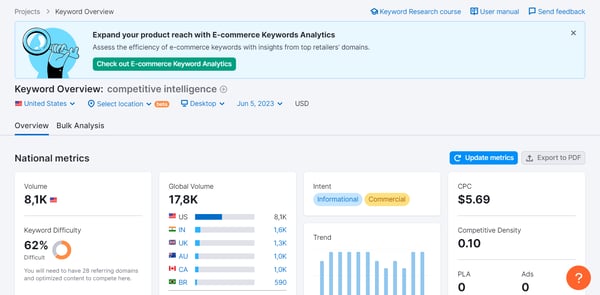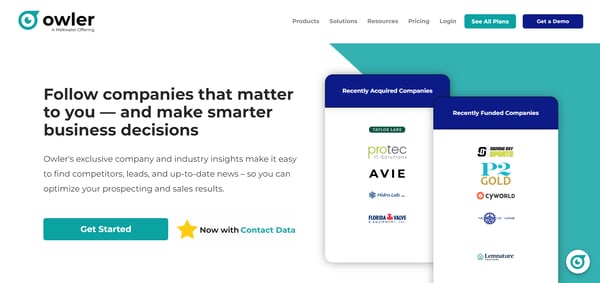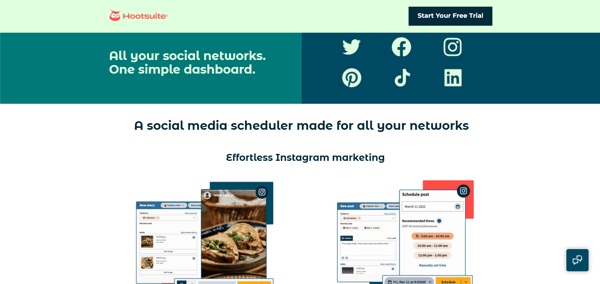Competitive Intelligence: Definition, Best Tools and How To Build a Strategy

Ecommerce is a fast-paced environment, huh? To stay ahead of the competition, we need constant improvement in all areas of our businesses. This is where competitive intelligence comes into play.
By gathering and analyzing information about competitors, market trends and industry dynamics, competitive intelligence can provide your business with valuable insights to help you in decision-making, making you stand out from the competition and earn a market share.
So if you think there’s always room for improvement, in this article, we’ll explore the definition of competitive intelligence, how it works, the best tools for it, and how to start your own competitive intelligence strategy.
With no further ado, brace yourselves, because competitive intelligence is coming.
What is competitive intelligence?
Competitive intelligence, often abbreviated as CI—unfortunately, not a fancy nickname—is a type of business intelligence that works on the systematic process of information gathering, analyzing and interpreting information about competitors.
It considers market conditions and other businesses in a particular market, focusing on understanding the competitive landscape, identifying emerging trends and assessing competitors' strategies.
For example, you can analyze data from multiple sources, such as your competitors' websites, overall market research reports, news, social posts and other branding strategies, all to gain a better understanding of their market position, and to make more accurate decisions based on a realistic scenario.
From one merchant to another: how competitive intelligence works
Competitive intelligence (CI) is an ongoing process, meaning that it requires a very systematic approach. It involves information gathering from various sources and analyzing it to transform it into actionable insights.
Let’s suppose you sell jewelry online and want to use competitive intelligence. That means you must visit your competitors’ websites occasionally to check what they’re doing, their strategy, and how they’re leveraging it.
To better understand the matter, we brought some competitive intelligence examples, so you can see what competitive intelligence focuses on:

For example, Mejuri is a great jewelry player in Canada, selling its products online. Even though it's a well-known brand, they still offer discounts and prizes to its customers, making them interested in having their first purchase there.
Okay, now you might think your business is still small, or you’re still planning to start your own online store. In that case, I can assure you competitive intelligence is a practice that suits businesses of all sizes.
You don’t need to do precisely what they’re doing, but understand it and see if that applies to your business by any chance to target the same market share they’re trying to conquer. Regarding e-commerce, you can even look for worldwide players and check their strategies.

For instance, Dipua is a Brazilian jewelry store that, despite the language barrier, you can see the company is doing practically the same as Mejuri. Now, you have a glimpse of how other brands are behaving in the digital landscape so that you can create a similar strategy as them.
The ways you can analyze it are not only by simply entering their pages. You can use an extensive range of tools and techniques such as data mining, focus groups, and even interview industry expects to get insights from them.
Another critical component of CI is competitor intelligence. This involves studying the strategies, strengths, weaknesses, and market positions of competitors. Sometimes, start-ups even try to talk with founders of brands that use the same business model—hey mate, can you give me your recipe?— to have a benchmark on their pricing strategies, marketing intelligence, and product offerings.
Building a competitive intelligence strategy
Now is the time to learn how to prepare your own strategy! To effectively leverage competitive intelligence, your strategy must be comprehensive to everyone working with you in this process.
To do so, there are some steps that you need to follow to make your strategy way more accurate.
Define objectives: You’ll have a better view of your strategy if you start by creating clear goals and objectives. By clear goals, we mean all the information you need to gather and how it will help you achieve your business objectives
Identify key component: Another essential point in this equation is identifying who will be involved in your strategy and how they will benefit from competitive intelligence. This may include sales teams, marketing teams and decision-makers in strategic planning. It’s okay if you’re just starting your business, but that means that the one in charge of all of this is you.
Select the right tools: If you’re alone or your team has a lot of work to do, choosing the best competitive intelligence tools will help you to avoid a lot of headaches. There are various competitive intelligence platforms available that offer features such as competitor monitoring, market research, and traffic analytics. You only need to pick the one that suits you best. We’re going to talk later about this, so don’t worry.
Gather competitive intelligence: This process uses a combination of tools and techniques to gather competitive intelligence. This may involve monitoring competitor websites, analyzing reports, attending trade shows, and utilizing social listening tools. This is under competitive intelligence research, another topic we’ll introduce to you in this article.
Analyze and interpret information: Once we have all the information gathered, we must identify trends, patterns, and key insights! This analysis will help you make better-informed decisions based on market trends and competitive intelligence best practices to help you develop effective strategies.
Share and implement findings: Once you discovered all the hidden secrets of this crazy market, communicate the findings and insights to the key stakeholders within your organization! By doing it, you can collaborate with teams to implement strategies based on the competitive intelligence gathered and boost the performance of your business!
Need another way to boost revenue? Learn how to increase sales!
Competitive intelligence research
We talked about gathering competitive intelligence and analyzing your competitors, and now is the time to clarify that all these activities are part of competitive intelligence research.
Competitive intelligence research is the systematic process of gathering data about competitor intelligence, market conditions, and industry dynamics, involving steps like collecting and analyzing data from various sources to gain insights into the competitive edge.
It aims to provide businesses with a better understanding of their competitors' strategies, strengths, weaknesses, and competitive position. The definition is similar to competitive intelligence, and that happens because competitive intelligence is a process that only exists because of competitive intelligence research!
To have competitive knowledge about your competitors, research is a vital ongoing process for businesses that want to stand out. The research process typically involves identifying the sources of information, such as competitor websites, market research reports, industry publications, news media, and social media platforms.
The targeted sources must provide valuable data on market trends, customer experience, product offerings, pricing strategy, marketing tactics, and other relevant information about competitors.
Once the data is collected, competitive intelligence professionals analyze and interpret it to identify trends, patterns, and key insights. They look for opportunities and potential threats in the market and use the research findings to inform strategic decision-making within the organization.
By doing research, your business can make better decisions and develop your own strategies. The competitive intelligence processes can be described below:
Research > Data Analysis > Strategy Creation > Strategy Application > Insight Analysis > Research >
As an ongoing process that requires continuous monitoring of the competitive landscape, competitive intelligence involves staying updated on industry news, tracking competitor activities, and regularly analyzing the gathered information to identify any shifts or changes that may impact the business.
That means, as an ecommerce entrepreneur, that you’re attached to competitive intelligence forever.
Is your research ready? So it’s time to build your marketing budget!
Who are the competitive intelligence professionals?
If you’re between careers or trying to recruit a team to your business, you must know what knowledge or professionals you must have under your umbrella.
Because they play a critical role in the processes, CI teams are responsible for providing tactical intelligence to support business decisions and having strong expertise in market research, data analysis, and strategic intelligence.
There’s an extensive list of professionals that can help you to use competitive intelligence analysis, like sales reps. However, we brought the two specialists that can help you the most with your marketing strategies, leaving only a small portion of the job to you:
1. Marketing and digital marketing specialists
These guys are the ones who always know online and offline market trends. The job of the marketing team is to help you market your products on the proper channels, creating new strategies and approaches to target your customers and make them more than just visitors to your physical or online store, but clients aiming to buy what you have in stock.
For example, they are in charge of researching what social media platforms your customers are present on and coming up with a special coupon for those who make a purchase coming from that specific platform, helping your sales team with the sales process.
They’re still the professionals that can understand, after research, that your business is more likely to perform well on TikTok Ads whether on television. Because of that, some of the soft skills that this professional must have are being aware of all of the newest trends in marketing and having an analytical mind, since they’re the strategic planners of your company.
2. Data analysts
Data analysts are in charge of extensive research, gathering numerical data and organizing it so the entire team can have helpful information of what is happening in the market.
For example, the digital marketing specialist comes with a new business strategy that’s helping your competitors to achieve massive success and a significant slice of the market and is worth a try to use on your business.
The data analysts are the ones who will follow up on all the campaigns and results, creating dashboards and other ways to visualize the results, to help the team to see if its good to continue pursuing this campaign or not, the improvements and different insights of what we can do to adapt it to our business model.
Numbers are super crucial to a business because they can impact your revenue. If you’re not a numbers guy, you need to think about adding someone to help you and your team to understand the importance of the actions you're taking to promote your business.
Knowing that the competition is crazy out there, these are the kind of professionals that you must be around.
Looking for an ecommerce platform? Discover Shoplazza!
Three competitive intelligence tools
To make your life easy and the work of your team very smooth, you should consider having tools to help your company with insights. Usually, data analysts have their favorite ones, but of course, it can be discussed as a team what can help you more in terms of the marketing efforts you want to make.
Several competitive intelligence tools are available to help businesses gather and analyze competitive intelligence information effectively. Here are some of the top tools:
SEMRush
A popular business intelligence tool for keyword research, competitive analysis, and traffic analytics. SEMRush provides many resources, especially for SEO marketers who use Google to increase website traffic.

If your company wants to start a blog, on this competitive intelligence platform you can look for several traffic data, information about ads related to the keyword, and even research the competition for specific keywords and terms on the search engines.
Owler
Owler is a platform that can provide competitive insights, company profiles, news and alerts on competitors.

They give users an excellent overview of the marketing, telling even recently acquired companies or newly founded ones. Track other companies' activities are super important for a lot of business models, and if you’re thinking about opening a new business, its excellent to see how the market is behaving about your future product.
Hootsuite
The platform tracks content trends, social media engagement, and competitor content performance. Hootsuite it's a power schedule tool for content for all the major social media channels and is commonly used by digital marketing professionals.

The platform has a great dashboard where you can measure the engagement of your social media channels and analyze what’s working for your target audiences, creating an all-in-one competitive environment for all your social media content strategies.
There are other tools that can help you to see the complete picture of your market intelligence, giving you tactical advice to improve organizational performance and help you identify the pain points of your business so you can stay always step ahead.
Competitive intelligence: conclusion

Ready to start your journey into the highly competitive business world?
In today’s market, gathering competitive intelligence is essential to remain competitive and make informed business decisions. By understanding the competitive landscape, you can identify emerging trends and analyze all your competitors.
This is a significant part of improving organizational performance and gaining a competitive advantage. Developing a comprehensive competitive strategy, utilizing the right tools, having the best competitive intelligence professionals and industry experts will empower your businesses, creating the perfect environment for your company’s success!
Remember, competitive intelligence is an ongoing market intelligence process, so ensure you’re regularly updating and refining your business strategy, to make sure you’re well-equipped to navigate the ever-changing business world with a great competitive analysis.
Ready to start your online store? Try Shoplazza now!









